PM hails historic response to Indian aggression, calls for peace and dialogue at UNGA session
Shehbaz Sharif calls Palestine's plight a "heart-wrenching tragedy," urging immediate ceasefire
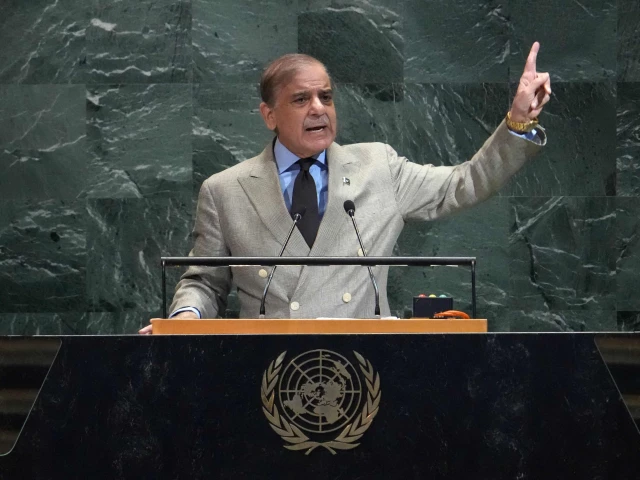
Prime Minister Shehbaz Sharif hailed the decisive response of Pakistan’s armed forces to Indian aggression as one that “will echo through the annals of history.” However, he called for peace, saying, “We have won the war, and now we seek to win peace.”
Addressing the 80th session of the United Nations General Assembly (UNGA) on Friday, PM Shehbaz said, “Pakistan’s foreign policy, guided by the vision of Quaid-e-Azam Muhammad Ali Jinnah, is rooted in peace, mutual respect, and cooperation. We believe in the peaceful settlement of disputes, dialogue, and diplomacy.”
He recalled that, from the same podium last year, he had warned that Pakistan would act decisively against external aggression. “Those words of mine proved true. When in May this year, my country confronted unprovoked aggression from our eastern front, the enemy came shrouded in arrogance; we sent them back in humiliation, delivering a bloody nose,” he said.
The prime minister declared that Pakistan had shot down seven Indian aircraft as an act of self-defence under the UN Charter in response of India aggression.
براہِ راست: وزیراعظم محمد شہباز شریف کا اقوام متحدہ جنرل اسمبلی کے 80 ویں اجلاس سے خطاب https://t.co/NqwuQeuG8g
— Government of Pakistan (@GovtofPakistan) September 26, 2025
He paid tribute to Pakistan’s armed forces, martyrs, and citizens for standing united during the confrontation, calling them an “unbreakable wall” against aggression.
The prime minister accused India of seeking to gain political mileage from the Pahalgam tragedy by rejecting Pakistan’s offer of an independent international investigation. Instead, he said, India attacked Pakistani cities and targeted innocent citizens.
“In accordance with the right of self-defence under Article 51 of the United Nations Charter, our valiant armed forces mounted an operation of stunning professionalism, bravery and acumen,” he added.
He praised Chief of Army Staff Field Marshal Asim Munir’s leadership and highlighted the role of the Pakistan Air Force. “Repulsing the enemy attack under Air Chief Marshal Zaheer Babar Sidhu, our falcons took flight and etched their answer across the skies, resulting in seven of the Indian jets turned to scrap and dust.”
The prime minister also extended an offer to India for a comprehensive and result-oriented dialogue on all outstanding issues, emphasising that South Asia needs proactive, not provocative, leadership.
"Pakistan stands ready for a composite, comprehensive and result-oriented dialogue with India on all outstanding issues. South Asia requires proactive rather than provocative leadership," he said.
Reiterating Pakistan’s resolve to defend the rights of its 240 million people to the Indus waters, the prime minister warned that any violation of the treaty would be viewed as "an act of war.'
PM lauds Trump, Guterres
PM Shehbaz acknowledged the role of US President Donald Trump in facilitating a ceasefire between the two nuclear-armed states.
“Though in a position of strength, Pakistan agreed to a ceasefire facilitated by President Donald Trump’s bold and visionary leadership. His timely and decisive intervention helped avert a full-fledged war in South Asia, the consequences of which could have been catastrophic,” the prime minister said.
In recognition of what he described as Trump’s “outstanding contribution to promoting peace in our part of the world,” the prime minister revealed that Pakistan had nominated the US president for the Nobel Peace Prize.
Lauding UN Secretary-General António Guterres for guiding the organization through difficult times, he urged the global community to recommit to justice, sovereignty, and respect for international agreements.
The premier also expressed gratitude for the diplomatic support extended by Pakistan’s allies. "We are profoundly thankful to our friends and partners, including China, Turkey, Saudi Arabia, Qatar, Azerbaijan, Iran, the UAE, and the UN Secretary General, for their steadfast support during this pivotal time," he stated.
Solidarity with people of Kashmir and Palestine
PM Shehbaz also delivered a forceful pledge of solidarity with the people of Kashmir, assuring them that “I stand with you, the people of Pakistan stand with you,” and asserting that “one day soon, India’s occupation of Kashmir will come to a grinding halt.”
He reiterated Pakistan’s call for Kashmir’s “fundamental right to self-determination” to be fulfilled through “an impartial plebiscite under the auspices of this very Organization, the United Nations,” and urged New Delhi to enter a comprehensive, result-oriented dialogue on outstanding issues.
Turning to the Middle East, the prime minister described the plight of the Palestinian people as “one of the most heart-wrenching tragedies of our times,” calling the prolonged injustice “a stain on the global conscience.”
He condemned what he called “brutal occupation” in the West Bank, and said the sustained violence in Gaza had unleashed “unspeakable terror upon women and children.” He accused Israeli authorities and illegal settlers of acts of brutality that have gone unchallenged, and said the current campaign in Gaza would be remembered “as one of history’s darkest chapters.”
The prime minister urged the international community to act immediately to secure a ceasefire, saying, “We must not fail the children of Gaza or any child anywhere in the world — we must find a path to a ceasefire now.”
He announced Pakistan’s firm support for the establishment of a sovereign Palestinian state based on pre-1967 borders with Al-Quds (Jerusalem) as its capital, and called for a full and committed effort to end Israel’s control over Palestinian territory.
He also condemns Israel's recent attack on Doha, calling it a serious violation of sovereignty and territorial integrity. "Pakistan stands unwaveringly with our brothers and sisters in Qatar," the premier said.
The premier further cautioned that the world has entered a more complicated phase, where international laws are being openly violated.
Condemns terrorism and view world as global village
Counting on the losses in the war against terrorism, PM Shehbaz stated that Pakistan has been 'on the front line of global counter-terrorism efforts for over two decades,' sacrificing more than 90,000 lives and suffering economic losses of approximately $150 billion."
The premier also emphasized the growing threat of terrorism, particularly from foreign-funded groups such as the TTP, Fitna al Khwarij, Fitna al Hindustan, and BLA, operating from Afghan soil. "These groups have been responsible for heinous attacks within Pakistan, including the Jaffer Express Train hijacking earlier this year, where 400 people were held captive," he said.
He added that, as a close neighbor and brotherly country to Afghanistan, Pakistan has a vested interest in a peaceful Afghanistan. "We believe that regional stability and connectivity are key to development and prosperity. Pakistan continues to engage with partners to provide humanitarian aid, promote economic recovery, and encourage an inclusive political framework in Afghanistan."
He also called on the interim Afghan government to uphold human rights, including women's rights, and take decisive action against terrorist groups. "It is crucial that Afghan soil is not used for terrorism against any country," he emphasized.
He stressed that Pakistan’s sacrifices “must be respected and appreciated,” adding: “A man killed in New York is a man killed in Lahore; a man killed in Islamabad is a man killed in London — we live in a global village. Until terrorism is defeated decisively, the world will not be a peaceful place.”
He warned that had Pakistan not confronted terrorists groups within its borders, “they might have been roaming the streets of New York, London or beyond,” calling this Pakistan’s “humble contribution not only for our own people, but for humanity at large.”
Draws world's attention to climate change
PM Shehbaz also drew global attention to the mounting climate crisis, recalling the “catastrophic floods of 2022 and 2025” that, he said, caused losses worth billions of dollars, displaced millions and claimed thousands of lives.
Despite contributing less than one per cent of global emissions, Pakistan “continues to face the relentless brunt” of climate change, he noted, adding that it was unfair for vulnerable countries to be asked to pile on debt to recover from disasters.
“This is not fairness, this is not equality, this is not justice,” he said, vowing that Pakistan would stand on its own feet through resilience and hard work.
The premier urged the international community to reconsider its approach to Pakistan’s financial challenges, especially in the wake of natural disasters. "How can we expect a country which is a developing country facing humongous flood challenges every year due to climate change and no fault of ours and yet we are told to borrow more loans?” he said. “I think borrowing loans would be destroying your economy, we will better off than not borrowing loans.”
While applauding the appointment of a UN special envoy to address Islamophobia, the Prime Minister issued a stark warning about the global threat posed by India’s Hindutva-driven extremism.
"There must be no space for hate speech, discrimination, or violence against any person or religion," he said. "Hate-driven ideologies, such as India’s Hindutva extremism, pose a danger to the entire world. While there is growing recognition of the dangers of Islamophobia, the urgency of effectively combating this menace cannot be overstated."
Concluding his address, the prime minister pledged that Pakistan would “always stand for peace, justice and development,” and called for a revitalized United Nations based on fair, inclusive multilateralism.
“Let this 80th anniversary not simply commemorate history — let us make history and chart a future for the next 80 years, as enduring hope for the global good,” he said. “Let us truly strive to become better together.”
White House rolls out red carpet for PM Shehbaz, Field Marshal Munir
US President Donald Trump on Thursday hosted Prime Minister Shehbaz Sharif for talks at the White House in the latest sign of warming relations between Washington and the South Asian nuclear power.
Sharif was among top officials from eight Arab and Muslim countries who met with Trump on the sidelines of the UN General Assembly this week to discuss strategy on ending the Israel-Hamas war in Gaza.
The two leaders discussed bilateral relations.
The prime minister was given a red-carpet welcome as he was arrived in Washington DC along with the Pakistani delegation to meet the US president.
Upon arrival at Andrews Air Base, the prime minister was welcomed on the red carpet by a senior US air force official.
The prime minister's motorcade left the airbase in the ring of US security. Field Marshal Syed Asim Munir also accompanied the prime minister.
On the US side, participants in the meeting are likely to include Secretary of State Marco Rubio, Vice President JD Vance, and senior defense officials, along with Trump.
Prime Minister Muhammad Shehbaz Sharif and Field Marshal Syed Asim Munir met with U.S. President Donald J. Trump at the Oval Office today.
— Government of Pakistan (@GovtofPakistan) September 26, 2025
The Prime Minister lauded President Trump's "bold, courageous and decisive leadership" for facilitating the Pakistan-India ceasefire and… pic.twitter.com/Xy5hHsl2Nk
This marks the third meeting between the prime minister and the US president in just three days — a record, as no Pakistani prime minister has previously held so many meetings with a US president in such a short span of time.
Ahead of the meeting, the US president, while speaking to the media, called PM Shehbaz and Field Marshal Asim Munir "great" people.
US-Pakistan ties have warmed in recent months under Trump after Washington had for years viewed Pakistan's rival India as a counter to China's influence in Asia.
Washington's relations with New Delhi have been tested under the Republican leader over issues such as visa hurdles for Indians, high tariff rates imposed by Trump on goods from India and Trump's repeated claims that he brokered an India-Pakistan ceasefire in May after the South Asian neighbors engaged in their latest hostilities.
The United States and Pakistan announced a trade deal on July 31 with a 19% tariff rate imposed by Washington. Trump is yet to reach a trade deal with India.
Trump welcomed Army chief Field Marshal Asim Munir earlier this year, the first time a US president hosted the head of Pakistan's army at the White House, unaccompanied by senior Pakistani civilian officials.
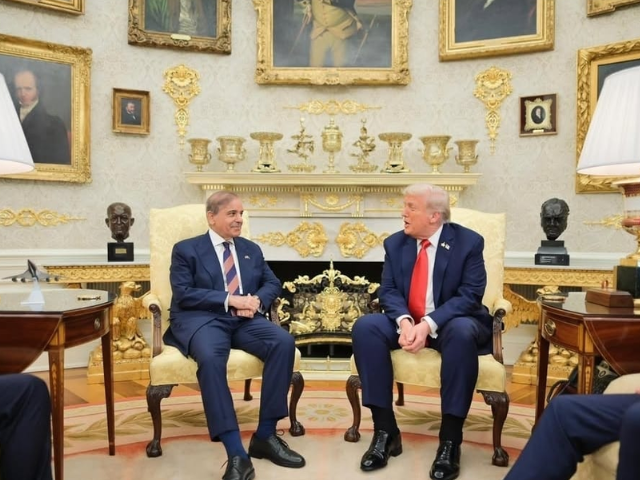
Photo: Government of Pakistan X account
"We're working through a number of issues when it comes to counter-terrorism, when it comes to economic and trade ties," a senior State Department official told reporters in a briefing on Tuesday when asked about Pakistan.
"And so the president remains focused on advancing US interests in the region, that includes through engaging with Pakistan and their government leaders," the official said.
When asked about frictions with India, the official said Trump believed in being frank about frustrations in ties but the relationship was strong.
Pakistan has backed Trump for the Nobel Peace Prize for his efforts in de-escalating tensions between India and Pakistan, although Islamabad has condemned US ally Israel's bombardments in Gaza, Qatar and Iran.
(With additional input from News Desk)

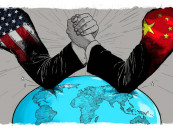
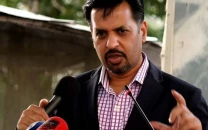
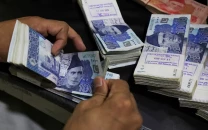

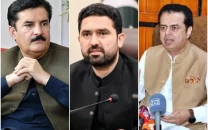
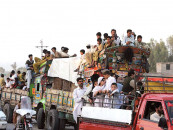













COMMENTS (9)
Comments are moderated and generally will be posted if they are on-topic and not abusive.
For more information, please see our Comments FAQ